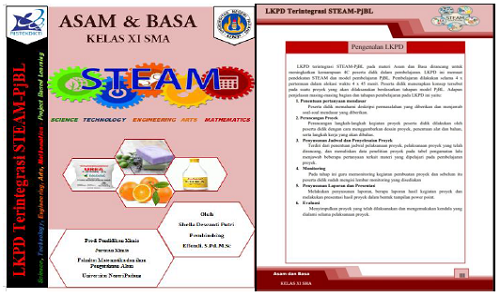
Development of STEAM-PJBL Integrated LKPD on Acid and Based Materials For Class XI SMA
Abstract
This study aims to develop teaching materials in the form of Student Activity Sheets (LKPD) which are integrated in Science, Technology, Engineering, Arts and Mathematics – Project-Based Learning (STEAM-PjBL) on Acids and Bases material and are used to determine the level of validity and practicality of the LKPD that is used. developed. This research is a research (R&D) with a 4-D development model. This 4-D model has four stages, namely the stages of define, design, develop and disseminate. However, the dissemination stage was not carried out. This study used instruments in the form of content and construct validation questionnaires, teacher and student response questionnaires. This LKPD was validated by five experts consisting of a Chemistry lecturer (FMIPA UNP) and a chemistry teacher. The validation data obtained were analyzed using the v Aiken scale, while the practicality data were analyzed using a comparison of students' scores with students' maximum scores. Based on the validation questionnaire that has been analyzed, it can be concluded that the LKPD developed is valid with a v value of 0.86 with a very valid category. While the practicality of teachers and students obtained NP values of 0.85 and 0.89 with very practical categories.
Keywords
Full Text:
PDFReferences
Annisa. (2018). Peningkatan Kemampuan Berpikir Kreatif Peserta didik Dengan Menggunakan Model Project Based Learning Berbasis STEAM (Science, Technology, Engineering, Arts dan Mathematic) Pada Materi Asam dan Basa di SMAN 11 Kota Jambi. Journal of the Indonesian Society of Integrated Chemistry, 10(2).
Astutik, S, et al . (2017). Effectiveness Of Collaborative Students Worksheet To Improve Students Affective Scientific Collaborative And Science Process Skills, Internal Journal Of Education And Research, 5(1), 152.
Bayles, J., Peterson, A. D., Pitts, S. J., Bian, H., Burkholder, S., Hegde, A. V., & Stage, V. C. (2021). Food-Based Science, Technology, Engineering, Arts, and Mathematics (STEAM) Learning Activities May Reduce Decline in Preschoolers’ Skin Carotenoid Status. Journal of Nutrition Education and Behavior, 53(4).
Boslaugh, S & Watters, P. A. (2008). Statistics In A Nutshell, A Desktop Quick Refrence. Beijing Cmabridge, Famham, Koln, Sebastopol, Taipei, Tokyo: O’reilly.
Buinicontro, JK (2018). Gathering STE(A)M: Perkembangan Kebijakan, Kurikuler, Dan Programatik Dalam Pendidikan Sains, Teknologi, Rekayasa, Dan Matematika Berbasis Seni Pengantar Edisi Khusus Tinjauan Kebijakan Pendidikan Seni: Fokus STEAM. Jurnal Tinjauan Kebijakan Pendidikan Seni Rupa. 2,119
Darmadi. (2017). Pengembangan Model Pembelajaran dan Metode Pembelajaran dalam Dinamika Belajar Peserta didik. Yogyakarta: Deepublish.
Depdiknas. (2008). Panduan Pengembangan Bahan Ajar. Jakarta: Direktorat Jenderal Manajemen Pendidikan Dasar dan Menengah.
Efstratia, Douladeli. (2014). Experiential Education Through project based learning. ELSEVIER. Procedia-social and behavioralsciences.152.
Hadinugrahaningsih et al. (2017). Keterampilan abad 21 dan STEAM Project dalam Pembelajaran Kimia. Jakarta: LPPM UNJ.
Hasnawati. (2021). Pendekatan Contextual Teaching Learning Hubungannya Dengan Evaluasi Pembelajaran. Jurnal Ekonomi Dan Pendidikan, 3(1), 475–479.
Jauhariyah, F.R., Suwono, H & Ibrohim. (2017). “Science, Technology, Engineering, Art and Mathematics Project Based Learning (STEAM-PJBL) pada Pembelajaran Sains” Pros, Seminar Pend. IPA Pascasarjana UM, 2 : 978-602-9286-22-9.
Nasir, M., Fakhrunnisa, R., & Nastiti, L. R. (2019). The Implementation of Project-based Learning and Guided Inquiry to Improve Science Process Skills and Student Cognitive Learning Outcomes. International. Journal of Environment & Science Education, 14(5), 229–238.
Nugroho, I. R., & Ruwanto, B. (2017). Pengembangan Media Pembelajaran Fisika Berbasis Media Sosial Instagram Sebagai Sumber Belajar Mandiri Untuk Meningkatkan Motivasi dan Prestasi Belajar Fisika Peserta didik Kelas XI SMA. Jurnal Pendidikan Fisika, 6(6), 460-470.
Permendikbud. (2014). Peraturan Menteri Pendidikan dan Kebudayaan No. 103 Tahun 2014 Pasal 2 ayat 7 dan 8 tentang Pembelajaran pada Pendidikan Dasar dan Pendidikan Menengah.
Purwanto. (2010). Evaluasi Hasil belajar. Yogyakarta: Pustaka Pelajar
Rahmawati, Y. (2018). Peranan Transformative Learning dalam Pendidikan Kimia: Pengembangan Karakter, Identitas Budaya, dan Kompetensi Abad ke-21. Jurnal Riset Pendidikan Kimia. 8(1), 1-5.
Sari, E. N., & Susilowibowo, J. (2022). Pengembangan E-Lkpd Berbasis Hots Pada Mata Pelajaran Praktikum Akuntansi Lembaga Kelas Xi Semester 2. Edukatif : Jurnal Ilmu Pendidikan. 4(3), 4469–4483.
Sibaweihi, N., Patel, R. G., Guevara, J. L., Gates, I. D., & Trivedi, J. J. (2021). Real-time steam allocation workflow using machine learning for digital heavy oil reservoirs. Journal of Petroleum Science and Engineering, 199
Sugiyono. (2014). Metode Penelitian Kuantitatif Kualitatif dan R&D. Bandung: Alfabeta.
Suryaningsih, S., & Nisa, F. A. (2021). Kontribusi STEAM Project Based Learning dalam Mengukur Keterampilan Proses Sains dan Berpikir Kreatif Siswa. Jurnal Pendidikan Indonesia, 2(6).
Thiagarajan, S; Semmel, D.S; & Semmel, M.I. (1974). Instructional Development for Training Teachers of Exceptional Children: A Sourcebook. Indiana: Indiana University.
Trianto. (2012). Model Pembelajaran Terpadu. Jakarta: Bumi Aksara.
Yakman, Georgette., Hyongyong, Lee. (2012). Exploring The Exemplary STEAM Education in the U.S. as a Practical Educational Framework for Korea. J Korea Assoc. Sci. Edu. 32( 6).
Yuliawati Yunus, M. S. (2019). Perancangan Dan Pembuatan Media Pembelajaran Berbasis Android Pada Mata Pelajaran Sisetem Komputer (Studi Kasus Kelas X Rpl SMK Negeri 2 Padang). Jurnal Pendidikan Teknologi Informasi, 6(1), 80-86.
DOI: http://dx.doi.org/10.31258/jes.7.2.p.148-159
Refbacks
- There are currently no refbacks.
Copyright (c) 2023 Shella Dewanti Putri

This work is licensed under a Creative Commons Attribution 4.0 International License.
Publisher: FKIP Universitas Riau












